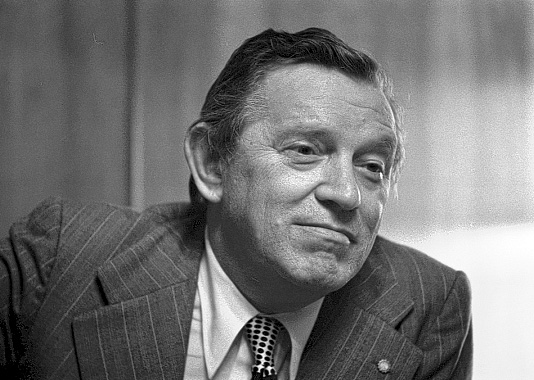Jose Ber Gelbard was born in Radomsko, Poland on April 14, 1917. In 1930 he emigrated to Argentina with his parents and siblings.They settled in Tucuman, 800 miles north of Buenos Aires. Those were though times and Jose had to make a living as a men's ties and belts street peddler. In 1938 he married Dina Haskel. They settled in Catamarca, a small town near Tucuman. He started a man's clothing store named "Casa Nueva York". He was a political activist, involved in several causes, including Jewish armed groups defending the Jewish community in Tucuman from the abuses of the local Nazi groups and the Union Democratica against Peron's first presidency in 1945. In the late 40's , he started to incubate the idea that the only way Argentina was going to grow as a country, was if the small and medium business would prosper and the millions of small industries and merchants would unite as a force that could negotiate with Peron's pro labor forces. In 1954 he moved with his family to Buenos Aires and almost immediately became part od Peron's cabinet as a minister without portfolio. He continued his fight for the small and medium business, opposing Imperialist interests and agro interests that would have preferred a country of grain and cattle exporters, in detriment of the millions of small industries and business. In this process, the CGE ("Confereracion General Economica") was born. It could be described as the Union of millions of industrialists and businessmen, with enough strength to negotiate with the government and the labor unions.
In 1955 there was a military coup that toppled Peron. Jose Ber Gelbard was prosecuted and his assets were frozen, just for being an advisor to Peron.
In later years, the Generals called elections, there were new coups d'etat, new presidents, new elections and Jose Ber Gelbard became, with no exceptions the advisor of all presidents, being Generals or democratically elected.
In 1972, as per a request from General Lanusse, the current dictator, Gelbard negotiated the return of General Peron from his exile in Madrid. After many trips and secret negotiations, elections were called and since Peron was not allowed to be President himself, one of his men, Dr. Hector Campora became president, in May 25 1973. Peron wanted a trusted Jew as his Economy Minister, and he even said that he wouldn't accept a Peronista government without Jose Ber Gelbard watching the economy. Finally in October 1973 Peron himself became president after some internal political shuffle. Jose Ber Gelbard implemented a plan, "The Social Pact" (El Pacto Social) which basically called for a truce in prices and salaries so the country could progress economically. He also gave a new impulse to exports by unilaterally lifting the Cuban blockade and selling one billion dollars in good to Cuba, including US branded cars manufactured in Argentina (which the US had to accept after a threat to close all US car factories in Argentina). Many economic missions were planned and large groups of Argentinean businessmen and industrialists headed by the Minister of Economy, visited Cuba, Venezuela, Chile, The Soviet Union, Poland, Hungary, Czhecoslovaquia among other countries.
On the 2nd. Of July 1974, Peron, the old statesman died. Internal fights for power erupted. Jose Ber Gelbard decided to resign. In March 1976 a bloody Military Junta took over Isabel Peron's presidency and in later years killed tens of thousands of people. Jose Ber Gelbard and his family left the country before the coup and obtained political asylum in the USA. All his assets in Argentina were quasi confiscated, frozen. There was a death sentence for him and his son Fernando. On October 4th. 1977, Jose Ber Gelbard died of a heart attack in Washington DC. His son Fernando fought the Junta, recovered all the family assets and in 1989 became Argentinean ambassador to France.

